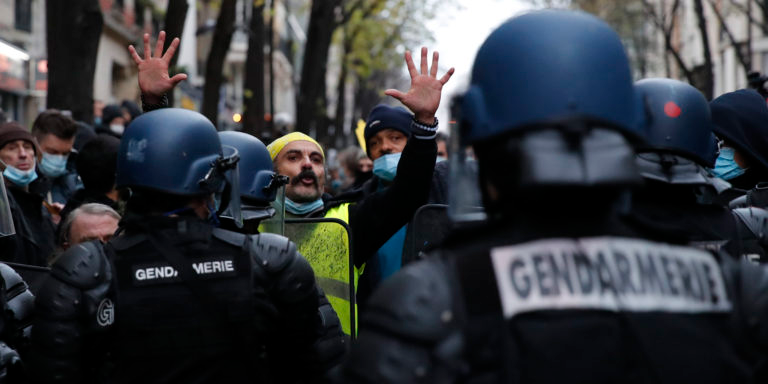
France was rocked by a second consecutive weekend of raucous protests in cities throughout the country in response to a proposed security bill that includes restrictions on filming law enforcement officers.
Protests, some of which turned violent, occurred in Paris, Marseille, Renne, and Lyon, as well as several other smaller French cities. Another primary driver of the protests is a video captured showing police beating Michel Zecler in late November. In the video, three white police officers severely beat Mr. Zecler, who is black, seemingly without provocation.
The protests evoked images of similar protests in the United States this summer, many in response to the murder of George Floyd by Minneapolis police. France’s Article 24, as initially drafted, makes it a crime to film police and upload those images with the intent to ‘harm their physical or psychological integrity.’ Protesters and others are concerned that the proposed change to the law with Article 24 is an attempt by the state to hide incidents of police misconduct under the guise of ‘officer safety.’ After several weeks of pressure, legislatures from President Emmanuel Macron’s LREM party (La République en Marche) announced a ‘complete new rewrite’ of the proposed law.
In evaluating the proposed Article 24, the inherent difficulties in determining online ‘intent’ would grant the state broad leeway and almost certainly lead to a curtailment of civil rights. LREM senior official Christophe Castaner initially said that Article 24 had two goals: to protect the police and to protect civil liberties. He now says his party will work to dispel concerns about the proposed law, noting that ‘when such a misunderstanding does not cease to intensify on such a fundamental subject, we have the duty to call ourselves into question collectively.’ The issue is unlikely to be resolved smoothly, and France is far from the only country struggling to deal with issues concerning ubiquitous social media and increased scrutiny of police conduct. The United States has long struggled with police misconduct and criminal actions, especially against minority communities. The ongoing ‘Defund the Police’ movement is a sign that local governments and their respective police departments need to better address ongoing concerns. The demonization of any individual or group calling for a change in the status quo of police operations has made nuanced discussions all but impossible. Similarly, the hijacking of nonviolent protests by violent groups also significantly complicates the debate and obfuscates the intended message. In the recent French protests, hundreds of Anarchists have joined the fray, launching projectiles at police, destroying property, and burning vehicles.
Legitimate concerns remain about threats online against police officers, as is the case for anyone threatened with violence. Nonetheless, restricting the public’s right to film representatives of the state engaged in official duties is neither constitutional nor an effective way to reduce tensions. Law enforcement worldwide has embraced public surveillance cameras, rightfully pointing out how valuable they are in investigating crimes. The same can be said for the many videos taken by the public showing police misconduct or even criminal behavior. Officials deserve protection from online threats and harassment, but restricting civil liberties or precluding mechanisms for accountability are never an appropriate response in democratic societies.
Over the past two decades, France has periodically found itself engulfed with protests against police brutality, and tensions between police and minority communities are especially high. In 2005, two boys were electrocuted after hiding in an electricity substation to avoid being apprehended by police in Clichy-sous-Bois. Several weeks of rioting and arson followed, as protests raged in response to allegations of widespread police harassment of minority groups and other longstanding grievances. French President Macron initially sought to pass the recent crime bill in efforts to highlight his tough approach to ‘law and order’ in advance of elections next year, where Macron expects to face a challenge from ‘nationalists’ on the right. The protests in response to police brutality are just one of several recent examples of instability in France. Periodically over the past several years, the so-called ‘Yellow Vests’ have demonstrated throughout the country in response to rising costs of living and growing inequality. Other protests have formed to push back against proposed reforms to France’s generous pension system. France also continues to struggle with terrorist attacks. Over the past eight years, France has suffered more than three dozen terrorist attacks, many of them inspired by Salafi-jihadist ideology, resulting in the deaths of hundreds of its citizens. Recent attacks against a French schoolteacher and at a cathedral in Nice and more fallout from the Prophet Muhammad cartoon controversy has put the spotlight back on France’s relationship with its Muslim population. France will continue to face such challenges as the government tackles the rewrite of the proposed law and more broadly aims to address protesters’ calls for change.
 Eurasia Press & News
Eurasia Press & News

